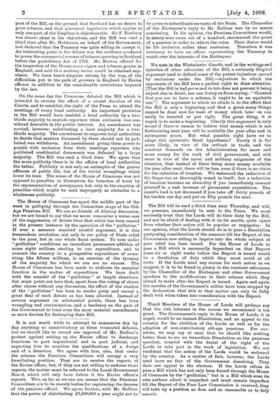We note in the Westminster Gazette, and in the writings
and speeches of other advocates of the Bill, a curiously illogical argument used to defend some of the patent injustices caused by exclusions under the Bill,—injustices to which the opponents of the Bill have a perfect right to draw attention. [That the Bill is bad parse and in tato does not prevent it being unjust also in detail, nor can it stop us from saying : "Granted that you are to have a scheme, it ought to be an equitable one."] The argument to which we allude is to the effect that the Bill is only a beginning, and that a great many things cannot be done now for want of money which later on can easily be inserted or put right. The great thing, it is urged, is to make a beginning. Clearly this argument is only sound if there is reason to believe that money which is not forthcoming next year will be available the year after and in subsequent years. But what possible right have we to adopt this optimistic fiscal hypothesis P Surely it is far more likely, in view of the setback in trade, and the constant demands on the Administration for more and more money for the work of civil government, and still more in view of the naval and military exigeneies ef the situation, that instead of there being more money available the year after next, there will be less, even if there is no claim for the reduction of taxation. We welcomed tbe rednction of the Sugar-tax as thoroughly sound in itself ; but a reduction of taxation becomes an absurdity if you immediately commit yourself to a vast increase of permanent expenditure. The camel's load is not decreased if you take off thirty pounds of his burden one day and put on fifty pounds the next.


















































 Previous page
Previous page